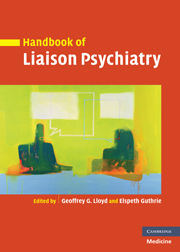Book contents
- Frontmatter
- Contents
- List of contributors
- Preface
- Part I Basic skills
- 1 The development of general hospital psychiatry
- 2 Establishing a service
- 3 Legal and ethical issues in liaison psychiatry
- 4 Understanding psychological reactions to physical illness
- 5 Detection of psychiatric disorders in the general hospital
- 6 The role of the nurse in liaison psychiatry
- Part II Common psychiatric problems across the general hospital
- Part III Working with specific units
- Part IV Treatment
- Part V Different treatment settings
- Index
- References
2 - Establishing a service
from Part I - Basic skills
Published online by Cambridge University Press: 10 December 2009
- Frontmatter
- Contents
- List of contributors
- Preface
- Part I Basic skills
- 1 The development of general hospital psychiatry
- 2 Establishing a service
- 3 Legal and ethical issues in liaison psychiatry
- 4 Understanding psychological reactions to physical illness
- 5 Detection of psychiatric disorders in the general hospital
- 6 The role of the nurse in liaison psychiatry
- Part II Common psychiatric problems across the general hospital
- Part III Working with specific units
- Part IV Treatment
- Part V Different treatment settings
- Index
- References
Summary
Introduction
Throughout the UK the provision of liaison services is variable both in terms of the existence of specialized teams based in the general hospital and the model of service delivered. The need for liaison psychiatric services has been documented (Benjamin et al. 1994; Royal College of Physicians and Royal College of Psychiatrists 1995, 2003; Royal College of Psychiatrists 2005), and the joint report by the Royal Colleges of Physicians and Psychiatrists (2003) proposes that this is best met via specialized multidisciplinary services based in the general hospital. This chapter leads on from previous work (Benjamin et al. 1994) in giving a more practical focus and detailing a step-by-step approach of how to establish a service. The chapter will be a useful starting point for trainees in psychiatry hoping to become consultants in liaison psychiatry and to establish a new unit. Likewise it will prove helpful to consultants in general psychiatry (some of whom may wish to move across to liaison psychiatry), health service managers and other clinicians who wish to develop such a service. Although the chapter is written from the perspective of a service for patients aged 16–65, the principles can equally be applied to service developments for children or older adults.
The chapter is divided into several sections. First, the initial negotiations are described, focusing on whom to involve and pertinent issues to discuss.
Information
- Type
- Chapter
- Information
- Handbook of Liaison Psychiatry , pp. 24 - 46Publisher: Cambridge University PressPrint publication year: 2007
